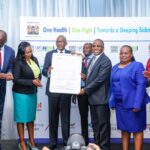Botswana has declared a national public health emergency as the country faces a critical shortage of essential medicines, medical supplies, and equipment, sending shockwaves through its healthcare system and economy. President Duma Boko, in a solemn televised address on Monday, announced that the government has initiated a multimillion-dollar emergency response plan, including military oversight of the supply chain, in a bid to stabilize the situation and restore access to life-saving treatments across the nation.
The president acknowledged the severity of the crisis, noting that addressing the shortages will be “highly price sensitive due to our limited coffers.” Botswana, with a population of 2.5 million people, is one of the world’s leading diamond producers. However, the nation’s economy has been significantly weakened by a downturn in the global diamond market. The crisis has been compounded by cuts to international aid, particularly from the United States, which previously played a central role in supporting Botswana’s fight against HIV/AIDS. These combined factors have contributed to rising unemployment, poverty, and growing pressure on the country’s healthcare infrastructure.
In his address, President Boko outlined that the Ministry of Finance has approved an emergency funding package of 250 million pula (£13.8 million, $18.3 million). He stressed that his government will work relentlessly to overhaul procurement systems and fix inefficiencies that have crippled the health sector. “The work shall remain nonstop until the entire value chain of procurement has been fixed,” he said, highlighting the administration’s commitment to transparency, efficiency, and urgency.
The current shortages are widespread and deeply concerning. According to the Health Minister, Dr. Stephen Modise, Botswana’s public hospitals and clinics are struggling to provide medicines and supplies critical to managing life-threatening illnesses such as cancer, HIV, and tuberculosis. The country’s world-renowned HIV treatment program has been particularly strained, with UNAIDS previously estimating that before recent cuts, US aid covered nearly one-third of Botswana’s HIV response. In addition, the health ministry reported debts exceeding 1 billion pula (£55.2 million), much of it accrued from referring patients to private hospitals for services that were unavailable in the public sector.
The Ministry of Health has already suspended referrals for elective surgeries and non-urgent procedures, including organ transplants, to prioritize resources for urgent and essential care. These measures underscore the gravity of the situation, with vulnerable populations such as children, cancer patients, and those living with chronic diseases facing the highest risks. UNICEF, in a statement, called for urgent action to protect the health and well-being of Botswana’s children. The agency noted that “malnutrition is a daily struggle” in some communities, particularly in the town of D’Kar, and welcomed the government’s efforts to stabilize the crisis while urging swift and sustained solutions.
Despite the grim circumstances, the government has expressed optimism. Dr. Modise reassured citizens that the health ministry is working around the clock to restore services and distribute medicines. “I have no doubt that soon, very soon, we will overcome. This is definitely not insurmountable,” he said, reflecting the administration’s determination to rally resources and partnerships in response to the crisis. As part of the emergency measures, the military has been tasked with leading distribution efforts. Trucks carrying essential medicines and supplies began departing from the capital, Gaborone, on Monday, with deliveries expected to reach even the most remote regions by nightfall.
President Boko, a Harvard-trained lawyer who made history last year when his Umbrella for Democratic Change (UDC) party ended 58 years of single-party dominance in Botswana, campaigned on promises to diversify the country’s diamond-dependent economy and prioritize reforms in governance and public services. His leadership is now being tested by this unprecedented health emergency, which has exposed long-standing vulnerabilities in Botswana’s economic and healthcare systems. The government’s response will not only determine the immediate well-being of millions but also serve as a measure of the new administration’s ability to deliver on its promise of change.
For now, Botswana finds itself at a crossroads. With international support weakened, domestic resources stretched, and health systems under severe strain, the country must navigate one of the most significant challenges in its modern history. Yet, there is a strong sense of resilience within the nation’s leadership and its people. As President Boko emphasized, the government will stop at nothing to fix the system, restore supplies, and protect the lives of its citizens. The weeks and months ahead will be critical in determining whether Botswana can stabilize its health sector and emerge from this crisis stronger, more self-reliant, and better prepared for the future.













Leave a comment